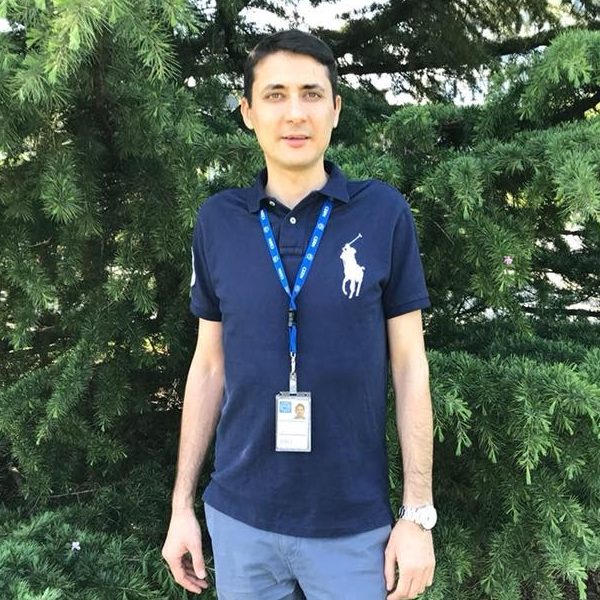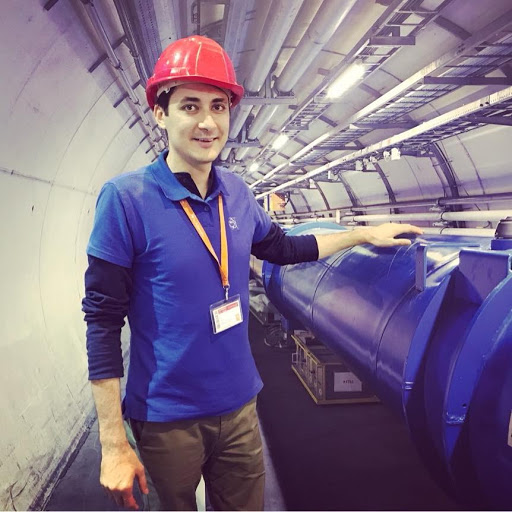
Adrian Buzatu completed his PhD in physics in 2011. His research involved the detection of a rare process of decay of the Higgs boson to two beauty quarks. Later, as a postdoctoral research fellow at the ATLAS experiment at CERN, he contributed with physics and software to the data analysis that detected the Higgs boson decaying to bottom quarks for the first time. At the time of this interview, he was a senior data scientist for the Berlin startup, Teraki, developing detection software for autonomous vehicles. Today, he continues to work as a senior data scientist, now for the company Parkling in Berlin, Germany.
Q: To start out, when did you decide to do a PhD and why did you decide to do it at McGill?
I come originally from Romania and I was passionate about physics in high school. I had heard about CERN, a big laboratory in Europe doing experimental particle physics, and a hot topic at the time was the Higgs boson, a fundamental particle predicted by the theory 50 years ago but not yet discovered at that time without which we wouldn’t exist—something quite fundamental about the universe. I basically already knew I wanted to go down this path as far as I could, so it was a natural progression for me to do a Master’s in physics and then a PhD. I first got a degree in engineering and physics in France, and at my university, there happened to be a professor from the University of Montreal. He was quite senior and quite knowledgeable of contacts, and he showed me opportunities and introduced me to groups at the University of Montreal, at McGill, and some American laboratories. At the time, CERN had a few delays in building their accelerator, so the biggest working particle accelerator was at Fermilab near Chicago in the US. That’s where McGill was contributing, and where I ended up working.
One reason that I did not apply to U.S. universities was that when I was studying in France, I was working part-time to support my studies there, and that was taking a lot of time. For the American universities and for the English-speaking part of Canada, you need to pass the GRE examinations, which required a lot of effort and time, which I actually did not have. Thanks to the fact that I had a French diploma and there is a treaty between the government of France and the government of Quebec, I did not have to take the GRE, which is why I chose Quebec above other provinces.
Q: What kind of support did you receive during your PhD?
I had a very good relationship with Andreas Warburton, my supervisor. I think he’s a great person and a great mentor. I could stop in at any time and ask questions. Also, thanks to his help with fellowship applications and funding he obtained, I was traveling a lot to Chicago for these experiments at Fermilab one or two weeks at a time. I was really happy to be able to focus fully on my studies and not have to worry about my financial situation. I learned a lot at Fermilab from experts coming from all over the world. I could travel there and talk to them in person just by knocking on their door. They were very friendly.
Q: Apart from research, what other things did you do during graduate school?
I was taking programming classes at Fermilab but also tutorials at McGill, like How to Teach Effectively, because I was a teaching assistant as well. I got involved also with the volunteer organization Let’s Talk Science McGill, visiting high schools in Montreal and talking about science or being a judge for science fairs. That was very impressive to me because I had never seen this before, this level of encouragement for high school students to do science. During the same time, I also created a website in Romania, my home country, where I was describing the news about particle physics and science, kind of forming a small community there. It was getting about 5000 readers one day, which, for Romania being a small country, was quite something.
Q: Were you consciously planning for the future when doing all these extra activities?
I was thinking I was on this path of going to academia because I enjoy teaching and science outreach. I was seeing myself continuing in this field for a long time. I was part of this question of the Higgs Boson, which was not yet finalized even at the end of my PhD, although the results of my PhD were the closest you could get at the time. So I wanted to continue with that.
When I was finishing my PhD I applied for postdoc positions and I found something right away from previous colleagues from Fermilab who were from the UK but doing this new experiment at CERN. Because they already knew me, that was a smooth transition, and I basically continued the analysis at the new experiment ATLAS. I also did another postdoc after that because the particle still hadn’t been discovered yet. I found some hints of it in my PhD but it was not enough. I wanted to be part of the full discovery, that’s why I extended my postdocs.
Two summers ago, we finally obtained the five standard deviation discovery of the Higgs boson decaying to bottom quarks. It was twelve years of research for me on this topic, five years at McGill and seven more afterwards. I was getting more and more senior, supervising and coordinating more people, getting more experience, and more advanced and finally, we discovered that particle. So it’s nice to see that the effort has paid off.

Q: How does your job today as a senior data scientist compare to the work you were doing in experimental particle physics?
It’s basically what I’ve been doing all along: analyzing big quantities of data by programming automatic pipelines to extract actionable insights using advanced statistics. For about a year now I’ve been working at a startup called Teraki that builds software for customers from the automotive industry building autonomous cars, which have lots of sensors. These sensors use LiDAR, which sends laser beams around that hit objects and, by the speed of light and the time it took to come back by reflection, it gives you back the depth at which a point is found, and by putting together all the points, a 3D view of the world. I’ve been working on building algorithms to make sense of these images. It’s quite similar to CERN because the idea is to look at an image, see what’s interesting and reject what’s not.
I’m quite happy in this field and I realize it’s still like academia in many ways because I’m still a scientist, I supervise students, I go to conferences, I do research, read papers, automate things, etc. But I’m also exposed to new things. In the data science team, we participate in the business calls because we need to understand what customers want, translate from general everyday language back to what our algorithm can do and then back to customers. It’s a very useful skill I’ve been developing in particle physics and in science outreach, explaining complex things in simple terms, and the other way around, simple terms to algorithms.
Q: What are some of the things you’ve learned about business and industry and how did you learn them?
My experience with startups has been great because, since they’re relatively small, you get to look at what the other departments are doing. You can see how things get put into production when you want to scale a product, or you can watch the business team preparing a proof of concept project, and so on. You wouldn’t be exposed to that just being in academia.
I also discovered that in industry there is a lot of hype—a lot of exaggeration. Companies are quite secretive because they want to keep their edge against others, so when someone says “we have done this”, they might not have started working on it already, but rather exploring the market to see if there is a need for such a product. That was the biggest cultural shock related to academia. Now I take everything with a grain of salt.
Q: Is there anything you know now that you wish you knew when you started your PhD, or advice you would give to incoming students?
What I didn’t know initially was that very few people actually end up becoming full professors in the end. So you should decide if the PhD is worth it for you. I’m still happy I did a PhD and I still recommend doing a PhD, but you have to be passionate and do a PhD where you can really learn stuff. I went to lots of training about how to write grants, prepare a CV, apply for jobs, but these all come back to communicating complex things in simple terms that your grandmother can understand. So you should participate in science outreach or these courses on learning to teach effectively. Learn to tell a story.
Many thanks to Adrian for sharing his PhD narrative! You can find more about him on his website, on Linkedin, and @DrAdrianBuzatu on Twitter.
This interview took place in May 2020. Interviews are edited by the TRaCE McGill Editorial team for length and clarity before publication.






Discussion